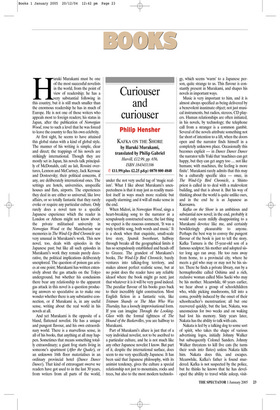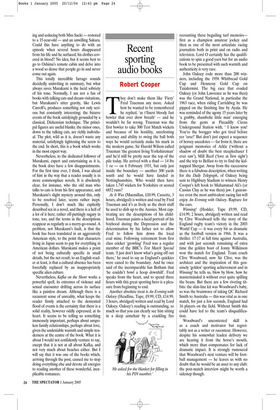Curiouser and curiouser
Philip Hensher
KAFKA ON THE SHORE by Haruki Murakami, translated by Philip Gabriel Harvill, £12.99, pp. 656, ISBN 1843431106 ® £11.99(plus £2.25 p&p) 0870 800 4848 Haruki Murakami must be one of the most successful novelists in the world, from the point of view of readership; he has a very substantial following in this country, but it is still much smaller than the enormous readership he has in much of Europe. He is not one of those writers who appeals most to foreign readers; his status in Japan, after the publication of Norwegian Wood, rose to such a level that he was forced to leave the country to flee his own celebrity.
At first sight, he seems to have attained this global status with a kind of global style. The manner of his writing is simple, clear and direct; the trappings of his novels are strikingly international. Though they are mostly set in Japan, his novels talk principally of McDonalds, café au lait, Rossini overtures, Lennon and McCartney, Jack Kerouac and Dostoevsky; their political concerns, if any, are deliberately international ones. The settings are hotels, universities, unspecific houses and flats, airports. The experiences they deal in are either so universal, like love affairs, or so totally fantastic that they rarely evoke or require any particular culture. Only rarely does a novel turn to a specific Japanese experience which the reader in London or Athens might not know about: the private militarised university in Norwegian Wood or the Manchurian war memories in The Wind-Up Bird Chronicle are very unusual in Murakami’s work. This new novel, too, deals with episodes in the Japanese past; but like all such episodes in Murakami’s work they remain purely decorative, the political implications deliberately unexplored. The question of poison gas arises at one point; Murakami has written extensively about the gas attacks on the Tokyo underground, but whether his conclusions there bear any relationship to the apparent gas attack in this novel is a question producing answers so speculative as to make one wonder whether there is any substantive connection, or if Murakami is, in any useful sense, writing about the real world in his novels at all.
And yet Murakami is the opposite of a bland, flattened novelist. He has a unique and pungent flavour, and his own extraordinary world. There is a marvellous sense, in all of his books, that anything at all may happen. Sometimes that means something totally extraordinary; a giant frog starts living in someone’s apartment (After the Quake), or an unknown 16th floor materialises in an ordinary provincial hotel (Dance Dance Dance). That kind of extravagant swerve we readers have got used to in the last 30 years, from writers from all parts of the world, under the not very useful tag of ‘magic realism’. What I like about Murakami’s unexpectedness is that it may just as readily manifest itself in ways much more realistic but equally alarming; and it will all make sense in the end.
When Midori, in Norwegian Wood, sings a heart-breaking song to the narrator in a scrupulously constructed scene, the last thing we expect is the raucous comment, ‘It was a truly terrible song, both words and music.’ It is a shock when that exquisite, small-scale love story, Sputnik Sweetheart, halfway through breaks all the geographical limits it has so scrupulously established and heads off to Greece. The grandest of Murakami’s books, The Wind-Up Bird Chronicle, barely ventures into talking-frog territory, and makes almost perfect realistic sense, but at no point does the reader have any reliable ideaof where the book might go next; just that whatever it is it will be very good indeed. The peculiar flavour of his books goes back to their incredibly tight construction. Most English fiction in a fantastic vein, like Tristram Shandy or The Man Who Was Thursday, has a loosely improvisational form. If you can imagine Through the LookingGlass with the formal tightness of The Hound of the Baskervilles, you are halfway to Murakami.
Part of Murakami’s allure is just that of a very individual novelist, not to be ascribed to a particular culture, and he is not much like any other Japanese novelist I know. But part of it, despite the international surface, does seem to me very specifically Japanese. It has been said that Japanese philosophy, with its animist tendency, gives the culture a special relationship not just to mountains, rocks and trees, but also to the most modern technolo gy, which seems ‘warm’ to a Japanese person, quite strange to us. This flavour is constantly present in Murakami, and shapes his novels in important ways.
Music is very important to him, and it is almost always specified as being delivered by a benevolent inanimate object; not just musical instruments, but radios, stereos, CD players. Human relationships are often initiated, in his novels, by technology; the telephone call from a stranger is a common gambit. Several of the novels attribute something not far short of intention to a lift, when the doors open and the narrator finds himself in a completely unknown place. Occasionally this becomes explicit — in Dance Dance Dance the narrator tells Yuki that ‘machines can get happy, but they can get angry too ... not like humans; with machines, the feeling is more finite’. Murakami rarely admits that this may be a culturally specific idea — once, in The Wind-Up Bird Chronicle, a Shinto priest is called in to deal with a malevolent building, and that is about it. But his way of thinking about the world is quite unlike ours, and in the end he is as Japanese as Kurosawa.
Kafka on the Shore is an ambitious and substantial new novel; in the end, probably it would only seem mildly disappointing to a Murakami devotee like me, and certainly bewilderingly pleasurable to anyone. Perhaps the best way to convey the pungent flavour of the book is just to tell the story. Kafka Tamura is the 15-year-old son of a famous sculptor; his mother and adopted sister long ago ran away. He too runs away from home, to a provincial city, where he meets a girl who may or may not be his sister. There he finds a private library, run by a hermaphrodite called Oshima and a rich, reclusive woman called Miss Saeki who may be his mother. Meanwhile, 60 years earlier, we hear about a group of schoolchildren who, while picking mushrooms, fell into a coma, possibly induced by the onset of their schoolteacher’s menstruation; all but one recovered quickly, but the last, Nakata, was unconscious for two weeks and on waking had lost his memory. Sixty years later, Nakata has the ability to talk with cats.
Nakata is led by a talking dog to some sort of spirit, who takes the shape of various advertising logos, initially Johnny Walker but subsequently Colonel Sanders. Johnny Walker threatens to kill five cats (he turns their souls into flutes) unless Nakata kills him. Nakata does this, and escapes. Meanwhile, Kafka’s father is found murdered. Kafka is not suspected by the police, but he thinks he knows that he has developed the ability to travel while asleep, visit ing and seducing both Miss Saeki — restored to a 15-year-old — and an unwilling Sakura. Could this have anything to do with an episode when several hours disappeared from his life and he surfaced, his clothes covered in blood? No idea, but it seems best to go to Oshima’s remote cabin and delve into a wood so dense that people go in and never come out again.
This totally incredible farrago sounds decidedly uninviting in summary, but what always saves Murakami is the lucid sobriety of his tone. Normally, I am not a fan of books with talking cats and dream visitations, but Murakami’s utter gravity, like Lewis Carroll’s, produces something not only serious but constantly interesting; the bizarre events of the book satisfyingly grounded by a classical, Dickensian technique. The principal figures are useful blanks; the minor ones, down to the talking cats, are richly individual. The plot, wild as it is, doesn’t waste any material, satisfyingly tightening the screw to the end. In short, this is a book which works in the most expert way.
Nevertheless, to the dedicated follower of Murakami, expert and entertaining as it is, the book does have a few disappointments. For the first time ever, I think, I was ahead of him in the way that a reader usually is in more commonplace novels. It is absolutely clear, for instance, who the old man who talks to cats is from his first appearance, and Murakami’s slight mystery around this, only to be resolved later, seems rather inept. Personally, I don’t much like explicitly described sex in a novel, and there is a hell of a lot of it here; rather off-puttingly sugary in tone, too, and the terms in the descriptions reappear as regularly as a merry-go-round. A problem, not Murakami’s fault, is that the book has been translated in an aggressively American style, to the point that characters living in Japan seem to pay for everything in American dollars. Murakami makes a point of not being culturally specific in small details, but the net result, to an English reader at least, is that a cultural absence has been forcefully replaced by an inappropriately specific alien culture.
Nevertheless, Kafka on the Shore works a powerful spell, its extremes of violence and sexual encounter drifting across its surface like a painless dream. Although there is a recurrent sense of unreality, what keeps the reader firmly attached to the demented flood of events is the certainty that there is a solid reality, however oddly expressed, at its heart. It seems to be telling us something immensely important, perhaps about unspoken family relationships, perhaps about love, given the undeniable warmth and simple tenderness at the centre of the book. What it is about I would not confidently venture to say, except that it is not at all about Kafka, and not very much about beaches either. But I will say that it was one of the books which, arriving through the post, caused me to stop doing everything else and devote all energies to reading another of these wonderful, inexplicable romances.








































 Previous page
Previous page